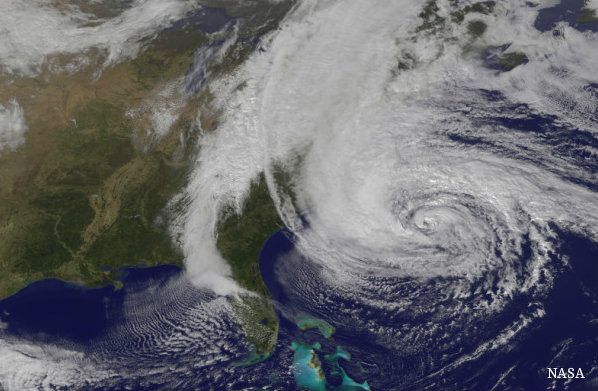Sandy happened too close to today’s election for the mainstream media to observe much beyond how commanding President Obama looked in his monogrammed bomber jacket, but the response has been a disaster.
For political leaders, Sandy seemed to be one giant photo op. President Obama got on TV to tell those hit by Sandy to go to the internet for information, if they still had internet. The president made a macho statement that he had set up a fifteen minutes rule whereby federal relief authorities had to return phone calls in that time frame. Wonder how that’s working out? Indications are that FEMA isn't doing that well.
Governor Chris Christie was absolutely right to butter up the president—if President Obama gets a second term, the New Jersey governor will have to work with him on behalf of the state that elected him. Also, until recently, people of different parties were able to work together. This was a good thing.
But Christie made Sandy seem somehow all about the president—it was too much. Now, we learn that Christie scored big: as a result of his performance, he got a call from Obama backer Bruce Springsteen. Fox reports:
Christie says he wept at home after talking by phone to his idol, calling it a major highlight during a tough week.
I almost wept after reading this about Chris Christie. Governor: there are people in your state who have lost everything, and you’re weeping over a call from the Boss? Get a grip, Big Guy.
What Sandy really revealed, as Bill McGurn explains brilliantly today in the Wall Street Journal, were the failures of blue state liberalism:
Judging from their numerous appearances on our TV screens, Michael Bloomberg and Barack Obama have come through Hurricane Sandy just fine. The same cannot be said for their brand of governing. Of all the vulnerabilities exposed by this storm, the biggest hit may have been to Blue State Liberalism.
The damage goes well past the obvious embarrassments. Those include Mayor Bloomberg's initial insistence that a yuppie marathon in Manhattan proceed—requiring a massive police and sanitation presence, as well as power sources—even as citizens on Staten Island were pleading for disaster relief. The embarrassments surely ought also to include Mr. Obama's 2008 campaign vow that his election would slow the rise of the oceans.
The silliness of those episodes speaks to a serious point about the great vulnerability of 21st-century American liberalism: an inability to set the priorities necessary for good government. As a result, government grows both bigger and less capable, especially for people who do not have the resources to fund other options. As Walter Russell Mead argued recently on his blog at The American Interest, our biggest cities represent a "colossal failure of blue social policy to create sustainable lower middle class prosperity."
Mr. Mead was writing in reference to the hell that our inner cities have become for many African-Americans. But the failure is larger than that, because so many of the government agencies that citizens depend on have morphed into jobs programs, where pensions take priority over performance. Compare, for example, the response of Verizon—which within 24 hours of Sandy's landfall had 95% of its cell service up and running in affected areas—with the glaring lack of hard information from the government for people shivering in cold homes without power.
Democrats and the media hailed Sandy as the poster storm for big government. If properly examined, Sandy may be just the opposite. But there is one New Yorker who has known what to do in the face of a natural disaster—the loquacious New York Governor Andrew Cuomo’s live-in girlfriend, Sandra Lee, has gone all out providing genuine help. The celebrity chef has brokered a $25,000 donation and five trucks of food from Sears to help people in need. She has gone to the Bowery Mission in lower Manhattan to cook meals for the homeless. In other words: private charity.


